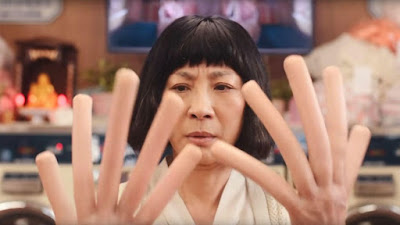I should have realised that, when “The Shape of Water” won in 2018, a truly original genre-based film like “Everything Everywhere All at Once” would eventually win the Academy Award for Best Picture. This year, I was worried that either the remake of “All Quiet on the Western Front” or “The Fabelmans” would win because they fit the stereotypes of films that perform well at award ceremonies: important dramas about the human condition, and/or a paean to the art of filmmaking.
Centred on an unconventional romance, inspired by “The Creature from the Black Lagoon”, “The Shape of Water” was the first fantasy film to have won the Best Picture Oscar since “The Lord of the Rings: Return of the King” in 2004, but if you classify it as science fiction, then “The Shape of Water” is the first sci-fi winner of the award.
For me, “Everything Everywhere All at once” winning Best Picture felt like if “The Matrix” had won in 2000, or “Back to the Future” in 1986, but neither film was even nominated – the films that won in these years were “Gladiator” and “Platoon”, with nominations including “Children of a Lesser God”, “The Mission”, “Chocolat”, “Erin Brockovich” and “Crouching Tiger, Hidden Dragon”, when foreign language nominations for Best Picture were still very rare.
I have never been convinced by those that said “The Matrix” was too complicated to follow for a mainstream blockbuster film, especially when “Inception” received a Best Picture nomination a decade later, and the success of productions by the Wachowski sisters and Christopher Nolan proves there is a wide audience for blockbuster films that make you sit forward, rather than sit back, released by their genres rather than trapped by them.
Sci-fi, horror, fantasy or other genre-based films have rarely won Best Picture, to the extent that I said to myself this year that, wow, a comedy has won, albeit one that has inhaled most other film genres in its representation of alternate universes. It is like “drama” has become the default in fictional film, instead of a genre in itself.
When I saw “Everything Everywhere All at Once” in May 2022, I wrote in my diary that it “was absolutely brilliant, perhaps the most imaginative science fiction film since ‘The Matrix’, and the kind of film I am not likely to see made again in a long time.” I like that I managed to successfully summarise the plot: “Michelle Yeoh [stars] as a laundrette owner who must save the world by accessing the ‘multiverse’ to harness the powers of alternate versions of herself.” It’s like baldly describing “Back to the Future” as someone trying to unite their parents before they cease to exist.
I also wrote “it has stayed with me too”. The resonance among its audiences over the choices we make, and lives not led, must have turbocharged the word of mouth that carried this film through the rest of 2022. Then again, “Everything Everywhere All at Once” is far more my sort of film than franchises like “Top Gun: Maverick” and “Avatar: The Way of Water”.
Michelle Yeoh, Ke Huy Quan and Jamie Lee Curtis deserve their Oscars based solely on the acting range they had to display across different roles and genres, while the film’s triumph for Asian representation in Hollywood means Stephanie Hsu will have her chance again soon. I am sure I didn’t think of this aspect at the time due to being caught up in the story, and my tastes in cinema not being centred in Hollywood.
What I like the most about “Everything Everywhere All at Once” winning the Academy Award for Best Picture is that it now shows there is an appetite for breaking the boundaries of what a mainstream film is, and those that break it will now be rewarded for it. This also guarantees that the next film to cause this much excitement may be just as original. Whatever that may be, I will have more of it please.


No comments:
Post a Comment